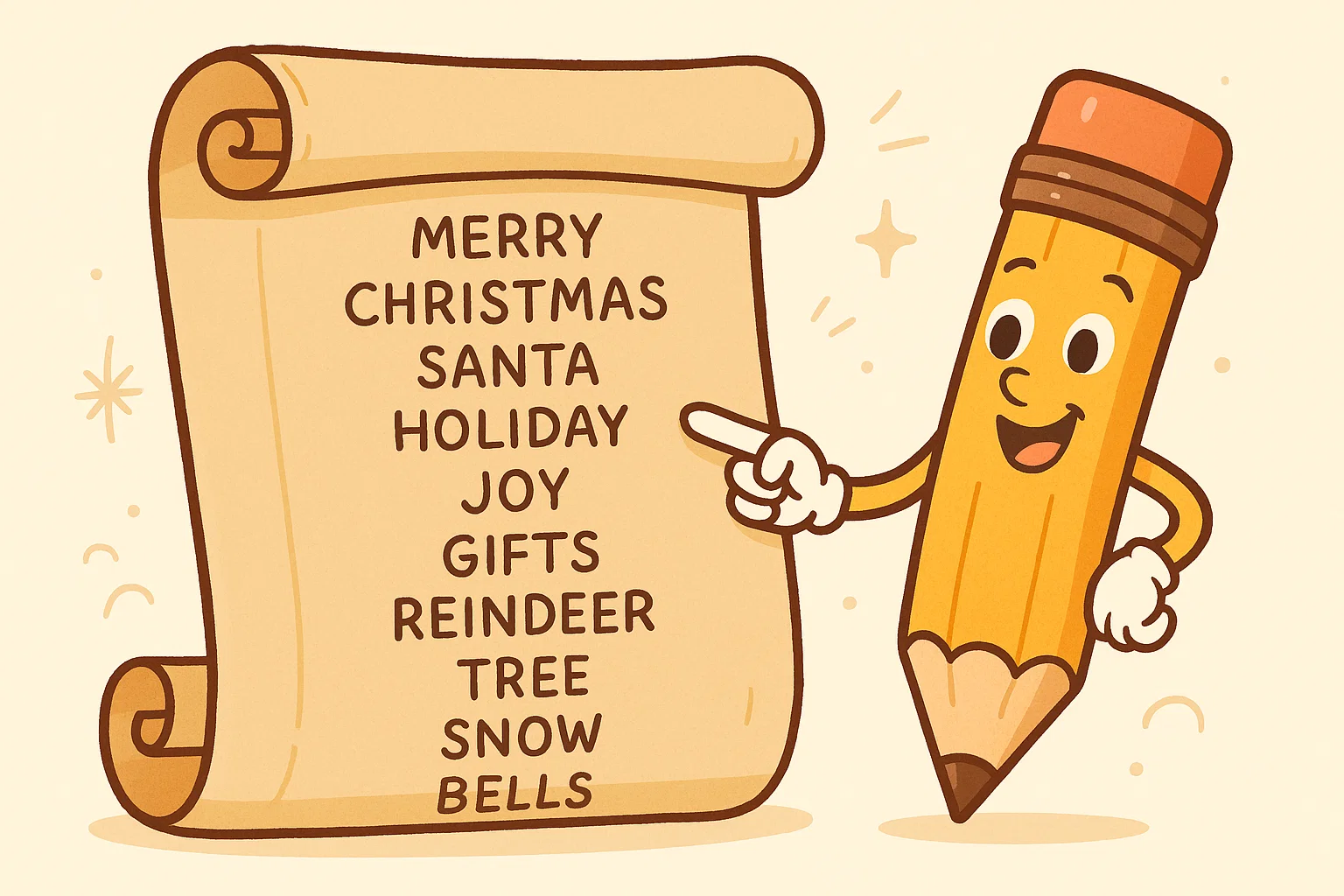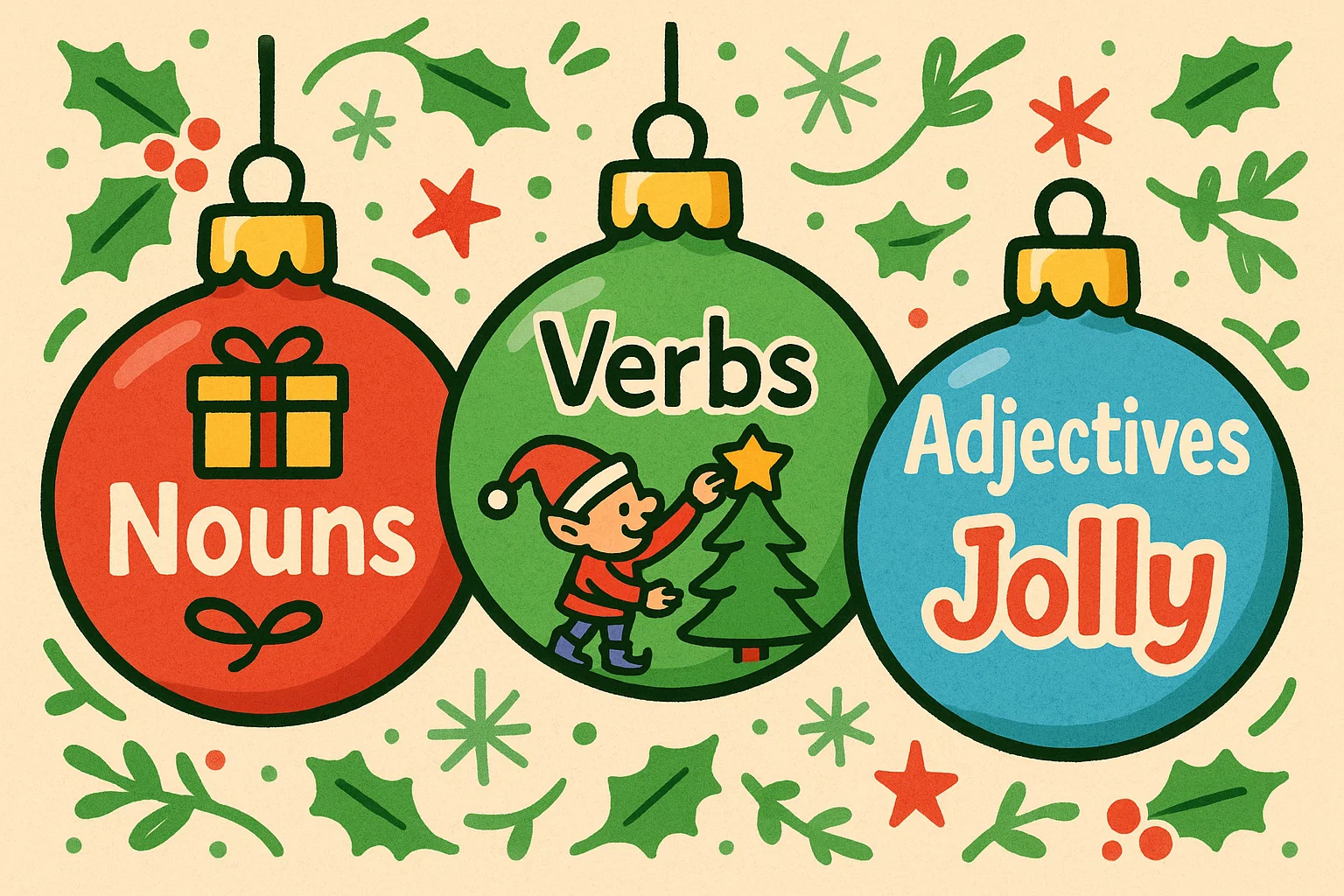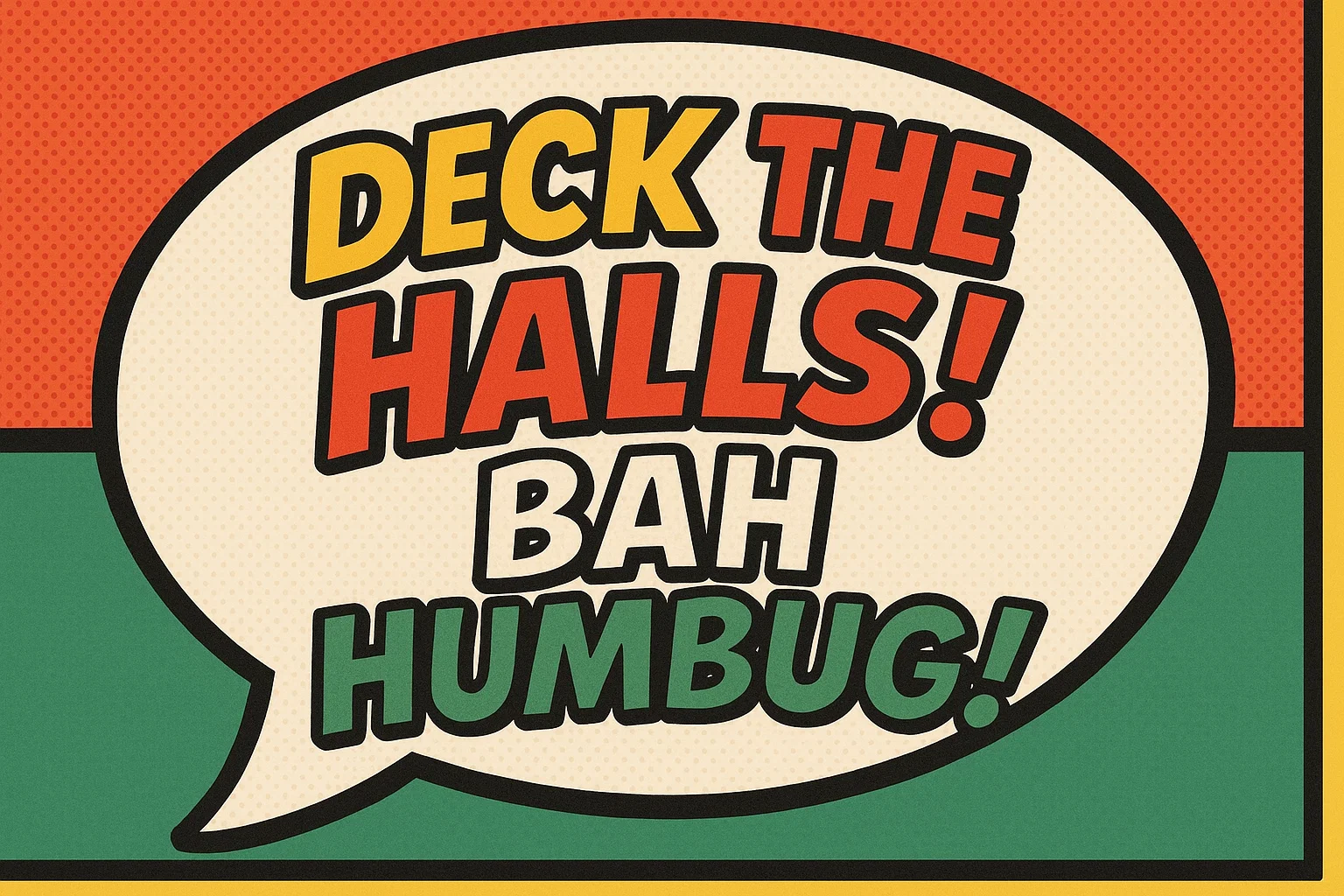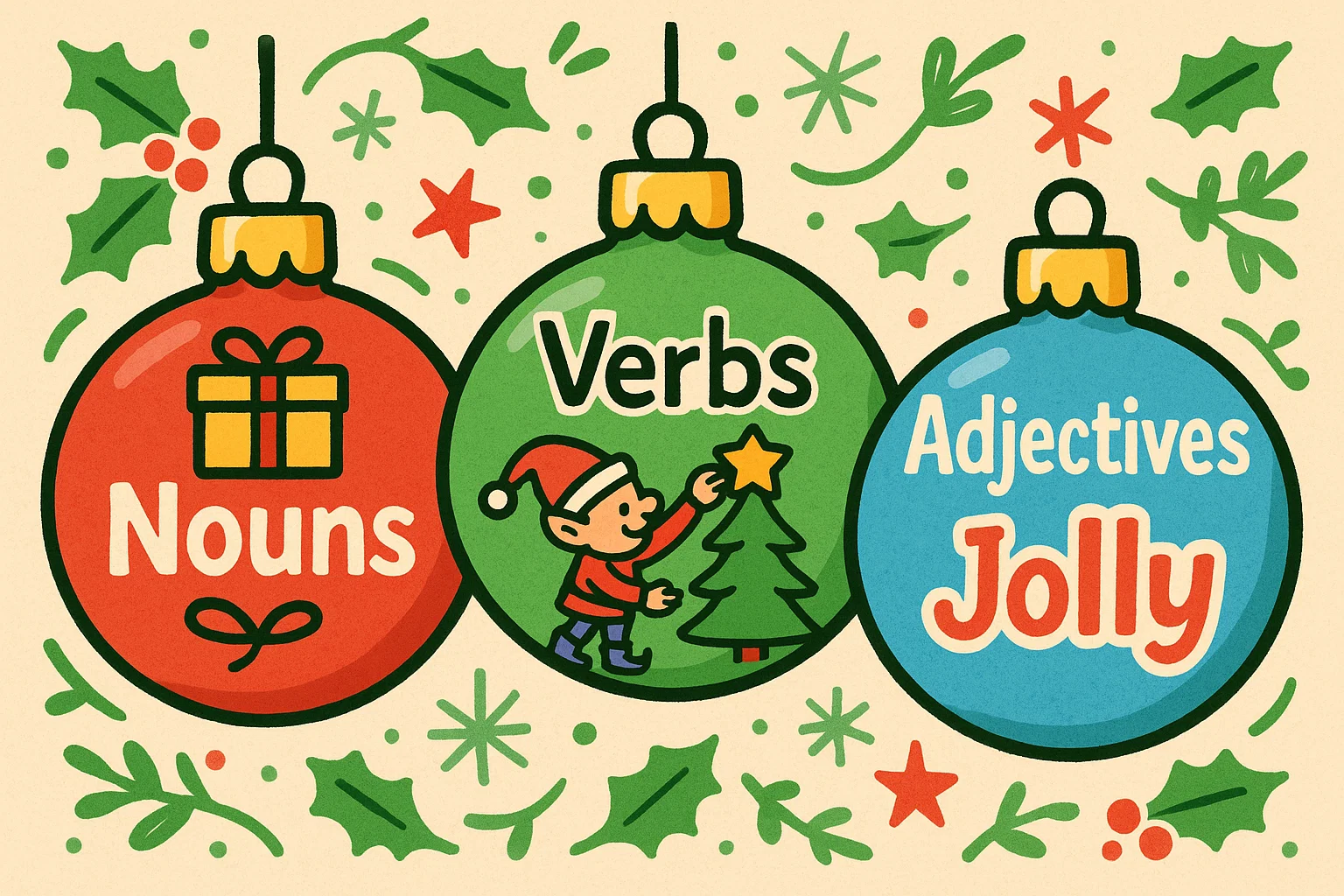The holiday season brings with it a rich vocabulary that captures the warmth, joy, and tradition of this festive time. Whether you’re crafting the perfect card, organizing classroom activities, or simply looking to expand your seasonal language skills, understanding festive words can enhance how you celebrate and communicate during this special occasion.
This comprehensive guide offers a carefully organized collection of holiday vocabulary, from traditional terms to unique expressions from around the world. You’ll discover how to use these words effectively in various contexts, making your seasonal communications more engaging and meaningful.
The Full List of Christmas Words

Building a strong foundation of festive vocabulary helps you express holiday cheer with precision and creativity. The following collection includes words that capture every aspect of the season, from decorations to traditions.
Christmas Words by Category
Organizing holiday terms by category makes it easier to find exactly what you need for specific activities or writing projects. This approach proves particularly helpful for educators planning classroom exercises or parents looking to engage children in holiday-themed learning.
Decoration and Setting:
- Ornament
- Wreath
- Garland
- Tinsel
- Lights
- Candle
- Mistletoe
- Holly
- Poinsettia
- Stocking
- Mantel
- Fireplace
- Chimney
Characters and Figures:
- Santa Claus
- Reindeer
- Elf
- Snowman
- Angel
- Shepherd
- Wisemen
- Rudolph
- Frosty
- Grinch
Activities and Traditions:
- Caroling
- Baking
- Decorating
- Gifting
- Celebrating
- Gathering
- Feasting
- Singing
- Shopping
- Wrapping
Food and Treats:
- Gingerbread
- Eggnog
- Fruitcake
- Candy cane
- Cookies
- Pudding
- Ham
- Turkey
- Cocoa
- Chestnuts
Christmas Word Lists with Definitions
Understanding the precise meaning of festive vocabulary enriches your ability to use these terms effectively. Here are key terms with their definitions:
| Word | Definition | Usage Context |
| Advent | The period of preparation for the holiday, beginning four Sundays before December 25 | Religious observance, calendar tradition |
| Nativity | The birth of Jesus Christ; also refers to artistic depictions of this event | Religious context, decorative scenes |
| Yuletide | An archaic term for the seasonal celebration | Formal writing, traditional phrases |
| Noel | A carol; also means the holiday in French | Songs, greetings, names |
| Epiphany | January 6, celebrating the visit of the Wisemen | Religious tradition, end of festive season |
| Wassail | A hot mulled cider drink; also the act of going door-to-door singing | Traditional beverage, caroling activity |
| Myrrh | An aromatic resin, one of the gifts brought to baby Jesus | Religious context, gift symbolism |
| Frankincense | A fragrant gum resin, another gift for the infant Jesus | Religious significance, traditional references |
How to Use These Christmas Words
The value of a strong holiday vocabulary extends beyond simple recognition. You can apply these words in multiple ways:
For Creative Writing: Select descriptive terms that evoke sensory experiences. Words like “twinkling,” “fragrant,” and “cozy” help readers visualize and feel the festive atmosphere you’re creating.
In Educational Settings: Organize vocabulary exercises by difficulty level. Start with simple words for younger children and progress to more complex terms. Research posted on ResearchGate suggests that thematic vocabulary instruction improves retention by up to 40% compared to random word lists.
For Holiday Communications: Choose words that match your audience and purpose. A letter to a child might include “Santa” and “presents,” while a formal card might incorporate “blessings” and “gratitude.”
Christmas Words by Theme and Part of Speech
Christmas Words by Category
Organizing holiday terms by category makes it easier to find exactly what you need for specific activities or writing projects. This approach proves particularly helpful for educators planning classroom exercises or parents looking to engage children in holiday-themed learning.
Decoration and Setting:
- Ornament
- Wreath
- Garland
- Tinsel
- Lights
- Candle
- Mistletoe
- Holly
- Poinsettia
- Stocking
- Mantel
- Fireplace
- Chimney
Characters and Figures:
- Santa Claus
- Reindeer
- Elf
- Snowman
- Angel
- Shepherd
- Wisemen
- Rudolph
- Frosty
- Grinch
Activities and Traditions:
- Caroling
- Baking
- Decorating
- Gifting
- Celebrating
- Gathering
- Feasting
- Singing
- Shopping
- Wrapping
Food and Treats:
- Gingerbread
- Eggnog
- Fruitcake
- Candy cane
- Cookies
- Pudding
- Ham
- Turkey
- Cocoa
- Chestnuts
Christmas Word Lists with Definitions
Understanding the precise meaning of festive vocabulary enriches your ability to use these terms effectively. Here are key terms with their definitions:
| Word | Definition | Usage Context |
| Advent | The period of preparation for the holiday, beginning four Sundays before December 25 | Religious observance, calendar tradition |
| Nativity | The birth of Jesus Christ; also refers to artistic depictions of this event | Religious context, decorative scenes |
| Yuletide | An archaic term for the seasonal celebration | Formal writing, traditional phrases |
| Noel | A carol; also means the holiday in French | Songs, greetings, names |
| Epiphany | January 6, celebrating the visit of the Wisemen | Religious tradition, end of festive season |
| Wassail | A hot mulled cider drink; also the act of going door-to-door singing | Traditional beverage, caroling activity |
| Myrrh | An aromatic resin, one of the gifts brought to baby Jesus | Religious context, gift symbolism |
| Frankincense | A fragrant gum resin, another gift for the infant Jesus | Religious significance, traditional references |
How to Use These Christmas Words
The value of a strong holiday vocabulary extends beyond simple recognition. You can apply these words in multiple ways:
For Creative Writing: Select descriptive terms that evoke sensory experiences. Words like “twinkling,” “fragrant,” and “cozy” help readers visualize and feel the festive atmosphere you’re creating.
In Educational Settings: Organize vocabulary exercises by difficulty level. Start with simple words for younger children and progress to more complex terms. Research posted on ResearchGate suggests that thematic vocabulary instruction improves retention by up to 40% compared to random word lists.
For Holiday Communications: Choose words that match your audience and purpose. A letter to a child might include “Santa” and “presents,” while a formal card might incorporate “blessings” and “gratitude.”
Christmas Words by Theme and Part of Speech

Categorizing vocabulary by grammatical function helps you construct more varied and interesting sentences. This organizational approach supports both language learning and creative expression.
Christmas Nouns
Nouns form the foundation of holiday vocabulary, naming the people, places, things, and ideas central to the celebration. These words help you identify and describe specific elements of festive gatherings.
Tangible Items:
- Gift (a present given to show appreciation)
- Tree (an evergreen decorated for the holiday)
- Bell (a ringing instrument associated with sleighs and church services)
- Star (a decorative topper representing the Star of Bethlehem)
- Ribbon (decorative material for wrapping and adorning)
- Bow (a decorative knot made from ribbon)
- Package (a wrapped gift)
- Sleigh (Santa’s traditional mode of transportation)
Abstract Concepts:
- Joy (a feeling of great happiness)
- Peace (a state of harmony and goodwill)
- Love (deep affection and caring)
- Spirit (the intangible mood or attitude of the season)
- Tradition (customs passed down through generations)
- Wonder (a feeling of amazement and delight)
- Magic (the enchanting quality of the occasion)
- Cheer (happiness and enthusiasm)
Christmas Verbs
Action words bring festive descriptions to life, showing what people do during the holiday season. These verbs help you create dynamic narratives and instructions.
Celebration Actions:
- Celebrate (to honor and observe a special occasion)
- Gather (to come together with others)
- Rejoice (to feel or show great joy)
- Unwrap (to remove the paper from a gift)
- Decorate (to make festive with ornaments)
- Illuminate (to light up with decorative lights)
- Trim (to decorate, particularly a tree)
- Adorn (to add beauty or decoration)
Giving and Sharing:
- Give (to present someone with a gift)
- Share (to divide and distribute among others)
- Donate (to give to charity)
- Exchange (to trade gifts with another person)
- Deliver (to bring gifts to recipients)
- Bless (to wish well or confer favor upon)
Seasonal Activities:
- Bake (to prepare treats in an oven)
- Sing (to perform carols)
- Jingle (to make a light ringing sound)
- Sparkle (to shine with small flashes of light)
- Glisten (to shine with a soft light)
- Twinkle (to shine with intermittent light)
Christmas Adjectives
Descriptive words help you paint vivid pictures of the holiday season. According to linguistic studies, using varied adjectives increases reader engagement and comprehension.
Atmosphere Descriptors:
- Festive (joyously celebratory)
- Jolly (cheerful and good-humored)
- Merry (full of cheerfulness)
- Cozy (warm and comfortable)
- Magical (enchantingly wonderful)
- Cheerful (noticeably happy)
- Bright (full of light and color)
- Warm (comfortable and welcoming)
Visual Qualities:
- Sparkling (shining brightly with flashes of light)
- Glittering (shining with many small flashes)
- Twinkling (shining with intermittent light)
- Snowy (covered with or resembling snow)
- Golden (having the color or shine of gold)
- Red (the traditional holiday color)
- Green (the color of evergreens)
- Silver (having a metallic sheen)
Emotional Qualities:
- Generous (freely giving)
- Peaceful (calm and serene)
- Loving (showing affection)
- Thankful (grateful and appreciative)
- Hopeful (full of expectation)
- Blessed (made holy or happy)
Rhyming Christmas Words
Rhyming words prove particularly valuable for creating poetry, songs, and memorable phrases. These pairs and groups help you craft creative holiday content.
Common Rhyme Sets:
- Bright/Night/Light/Sight
- Bell/Well/Spell/Tell
- Snow/Glow/Know/Show
- Tree/See/Glee/Free
- Joy/Boy/Toy
- Star/Far/Are
- Cheer/Near/Dear/Year
- Sleigh/Day/Way/Play
Creative Applications: You can use these rhyming words in classroom activities where children create their own festive verses. For example: “The bells ring bright on winter night, filling hearts with pure delight.”
Short Christmas Words
Brief words offer practical advantages in various contexts, from creating social media posts to designing decorative cards where space is limited.
One-Syllable Words:
- Joy
- Gift
- Star
- Tree
- Bell
- Snow
- Love
- Peace
- Light
- Cheer
- Home
- Wish
- Hope
- Warm
Two-Syllable Words:
- Present
- Santa
- Merry
- Spirit
- Carol
- Candle
- Cookie
- Dinner
- Family
- Gather
These concise terms work effectively in limited spaces while maintaining clear meaning.
Unique and Thematic Christmas Words
Beyond common vocabulary, the festive season includes distinctive terms that add depth and cultural richness to your holiday expressions.
Unique Christmas Words
Certain seasonal words stand out for their specific associations or historical significance. These terms may not appear in everyday conversation but enhance festive communication.
Distinctive Terms:
- Christingle: An orange decorated with a candle and sweets, used in children’s Advent services to symbolize different aspects of the holiday and Jesus’s love
- Mumming: A folk tradition where people dress in disguise and perform short plays during the winter season
- Posada: A Mexican tradition reenacting Mary and Joseph’s search for lodging
- Reveillon: A festive long dinner held on the holiday eve or New Year’s Eve, particularly in French-speaking cultures
- Saturnalia: An ancient Roman festival that influenced many modern traditions
- Yule log: Originally a large log burned in the hearth during the celebration; now also refers to a chocolate cake shaped like a log
Religious Christmas Words
The spiritual dimension of the holiday includes specific vocabulary that reflects the season’s origins and sacred meaning. These words appear in church services, religious texts, and faith-based celebrations.
Core Religious Terms:
- Nativity: The birth of Jesus Christ
- Messiah: The promised deliverer in Christian belief
- Emmanuel: Meaning “God with us,” a name for Jesus
- Bethlehem: The birthplace of Jesus
- Manger: The feeding trough where Jesus was laid
- Incarnation: God taking human form in Jesus
- Advent: The coming or arrival; the period preparing for the celebration
- Savior: One who saves from danger or destruction
- Gloria: A hymn of praise, often sung during the season
- Hallelujah: An expression of worship and praise
Context Matters: When using religious terms, consider your audience. In interfaith settings, you might balance religious and secular words to respect diverse beliefs while honoring the traditions meaningful to you.
Christmas Words in Other Languages
Exploring how different cultures express the holiday enriches your understanding of global celebrations. These international terms reflect varied traditions around the world.
European Languages:
- Joyeux Noël (French): Merry holiday greeting
- Feliz Navidad (Spanish): Merry holiday greeting
- Buon Natale (Italian): Merry holiday greeting
- Frohe Weihnachten (German): Merry winter celebration
- God Jul (Swedish): Good holiday
- Feliz Natal (Portuguese): Merry celebration
Beyond Europe:
- Meri Kurisumasu (Japanese): Merry greeting
- Sheng Dan Kuai Le (Mandarin): Merry greeting
- Chúc Mừng Giáng Sinh (Vietnamese): Merry greeting
- Maligayang Pasko (Filipino): Merry greeting
- Heri ya Krismasi (Swahili): Merry greeting
Using these phrases demonstrates cultural awareness and can make holiday greetings more personal when communicating with people from different backgrounds.
Rare Words Associated with Christmas
The English language contains lesser-known terms connected to winter holiday traditions and history. While not commonly used today, these words add linguistic depth.
Historical and Archaic Terms:
- Yuletide: The festive season, from the Old Norse “Jól”
- Wassailing: Going house to house singing carols and drinking to people’s health
- Boxing Day: December 26, when servants historically received gifts from employers
- Twelfth Night: The evening before Epiphany, marking the end of seasonal celebrations
- Christmastide: The festival season from December 25 to Epiphany
- Mummers: Masked performers who travel door-to-door during winter
- Hogmanay: The Scottish New Year’s Eve celebration
Christmas Phrases and Idioms

Moving beyond individual words, phrases and idioms capture the complete thoughts and traditional expressions of the season.
Common Christmas Phrases
Familiar phrases serve as verbal shorthand for holiday sentiments. You’ve likely heard these expressions countless times during the festive season:
Traditional Greetings:
- “Merry celebration and a Happy New Year”
- “Season’s Greetings”
- “Happy Holidays”
- “Peace on Earth”
- “Joy to the World”
- “‘Tis the Season”
- “Deck the Halls”
- “Jingle All the Way”
Descriptive Phrases:
- “Holiday spirit”
- “Holiday cheer”
- “Winter wonderland”
- “Festive magic”
- “Festive season”
- “White winter”
- “Silent night”
- “Winter miracle”
Activity-Based Phrases:
- “Trimming the tree”
- “Hanging stockings”
- “Making a list and checking it twice”
- “Home for the holidays”
- “Spreading seasonal cheer”
- “Counting down to December 25”
Christmas Idioms and Their Meanings
Idioms are expressions whose meanings differ from their literal interpretations. Festive idioms appear in conversation, literature, and media throughout the holiday season.
Common Seasonal Idioms:
- “Bah, humbug!”
- Meaning: An expression of disgust or contempt, particularly toward festivities
- Origin: Popularized by Ebenezer Scrooge in Charles Dickens’s “A Christmas Carol”
- Usage: “When I suggested caroling, my teenage son said ‘Bah, humbug!’”
- “Christmas comes but once a year”
- Meaning: A justification for indulgence or extravagance during the holiday
- Usage: “I know the sweater’s expensive, but the celebration comes but once a year”
- “Like turkeys voting for Christmas”
- Meaning: Choosing an option that will harm oneself (primarily British)
- Usage: “Supporting that policy would be like turkeys voting for their demise”
- “All I want for Christmas”
- Meaning: Expressing a strong desire for something
- Usage: “All I want for December 25 is some peace and quiet”
- “Christmas has come early”
- Meaning: Receiving something good unexpectedly or ahead of schedule
- Usage: “When I got the promotion in November, the celebration came early”
- “On Santa’s naughty list”
- Meaning: Behaving badly or mischievously
- Usage: “With all that teasing, you’re definitely on the naughty list”
Tips for Using Festive Phrases
Incorporating seasonal phrases effectively requires attention to context, audience, and purpose. Here are practical strategies:
Match Tone to Situation: Formal business communications might use “Season’s Greetings” or “Wishing you joy this holiday season,” while personal messages to close friends can include playful phrases like “Santa’s watching!” or “Have yourself a merry little celebration.”
Consider Cultural Sensitivity: In diverse settings, phrases like “Happy Holidays” or “Season’s Greetings” acknowledge that not everyone celebrates the same winter traditions. According to a 2023 workplace communication study, inclusive language increases positive responses by 34% in multicultural environments.
Create Fresh Combinations: While traditional phrases remain popular, you can craft original expressions by combining familiar words in new ways. Instead of standard greetings, try “Wishing you a season filled with warmth and wonder.”
Use Phrases as Writing Prompts: In classroom settings, give students a festive phrase and ask them to expand it into a story or poem. The phrase “winter wonderland” might inspire descriptions of snowy landscapes or magical holiday scenes.
Adapt for Social Media: Shorter phrases work better for platforms with character limits. “Joy to the world” or “‘Tis the season” convey holiday spirit concisely while remaining memorable.
Layer Multiple Phrases: When you have more space, such as in holiday letters or cards, combine several phrases to create a richer message: “May your days be merry and bright, filled with peace on earth and goodwill toward all.”
Frequently Asked Questions About Christmas Vocabulary
Using christmas-themed vocabulary enhances the way you celebrate the season. From describing your beautifully decorated christmas tree to crafting unique holiday greetings, the right words deepen the experience. Teachers often use christmas-themed words for engaging holiday-themed activities in the classroom, boosting engagement as children learn to celebrate the season with language.
Absolutely. While we include common terms, the sections on “Unique Christmas Words” and “Words in Other Languages” specifically target adult readers and advanced students. These sections introduce truly new words that are used around christmas or in historical contexts, enriching your general vocabulary and supporting advanced writing exercises.
Description for this block. Use this space for describing your block. Any text will do. Description for this block. You can use this space for describing your block.
This entire collection is designed to support literacy and improve communication skills. By providing organized christmas-themed vocabulary, definitions, and examples of phrases, the article gives a strong foundation for various writing exercises, such as composing holiday stories, poems, or letters. Focusing on spelling and definition accuracy is a core goal of this resource.
Yes. Beyond academics and holiday-themed activities, understanding this wide range of festive words is key for maximizing personal enjoyment and savings. For instance, knowing the specific terms used around christmas helps you better navigate advertisements and spot the best christmas offers and deals, whether they relate to decorations for your christmas tree or travel packages to celebrate the season.


